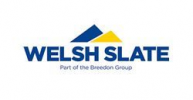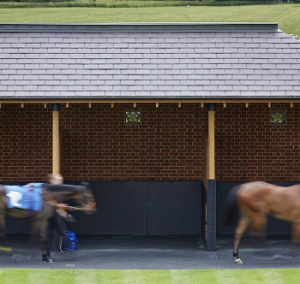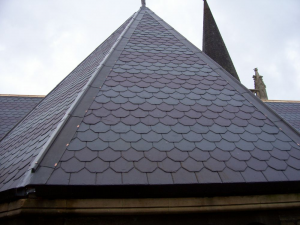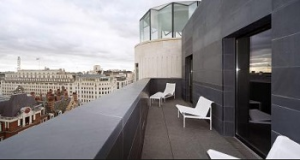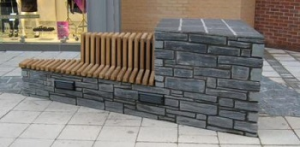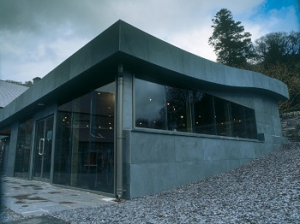WELSH SLATE
Suppliers of: Roofing slates, Slate cladding, Slate paving, Walling, Sills and copings, Landscaping, Aggregates, Slate tiles for flooring, Fire surrounds/hearths, worktops/counters
Welsh Slate is the world’s leading supplier of high quality slate and supplies the UK construction market with highly durable roofing slates, facade cladding, slate paving, walling, sills and copings. For internal projects, Welsh Slate manufacture and supply slate tiles for flooring, fire surrounds, bespoke kitchen worktops and counters.
COVID-19 UPDATE: We are open for business as usual and look forward to receiving your enquiries.
Environmentally Responsible
Welsh Slate’s Penrhyn quarry has been supplying slate worldwide since the 13th Century and has a long tradition of being specified by architects, and our client base also includes leading developers and interior designers. As a result of our work we are committed to conducting our business in an environmentally responsible manner by minimising the environmental impact and promoting sustainable development within its operations and services.
CPD Seminar
This seminar is designed to help architect and specifiers to understand the manufacturing process and the potential applications of Welsh Slate as a building material. It will explain the advantages and problems with slate and clarify the difference between differnent slates from around the world. The presentation will inform delegates of the variety of applications for Welsh Slate and provide information on the standards, accreditations, classifications and fixing methods.
CPD Factory Tour
The two hour tour will demonstrate the current slate quarrying and production processes while in addition giving you some hands on experience of working with a natural product. For enquiries or to arrange a CPD please telephone our sales office on the telephone number above or alternatively click here and fill out an enquiry form.
Our wide range of products include:
Roofing Slate
Welsh slate is proven to out last any other roofing material and is guaranteed to have a productive life in excess of 100 years. Colour variants are available and can be supplied up to 1.2 meters wide.
External Slate Paving
Welsh slate is available in a range of thicknesses from 30mm to 100mm and a variety of colours and textures to suit any application. Slate paving is frost-resistant and slip resistant certified to BS EN1341:2001
Welsh slate is weather and waterproof, unaffected by atmospheric pollution, sea air and organic growth and is colour-fast and non-fading, even in UV light. Certified and tested to BS EN 12326 - 1:2004
Welsh Slate Flooring
Welsh slate is a hard wearing natural floor tile for use in both domestic and commercial applications. The material is highly durable and easily maintained. As an unpolished floor tile Welsh slate is slip resistant to BS EN 1341:2001.
Facade Cladding & Masonry
Welsh slate facade cladding is ideal for use on either internal or external cladding products and is an ideal material for use on ventilated rainscreen cladding. Welsh slate masonry units are available in course heights of up to 180mm and to random or specified lengths with pillared or sawn face.
Our facade cladding is supplied to bespoke sizes and has been installed in diverse applications such as public buildings and churches to industrial and commercial developments and residential properties.
Stone Walling
Welsh slate makes an ideal walling product and is available as either quarried rustic walling with a naturally exposed face or as a smooth faced pillared walling face.
Sills & Copings
Welsh Slate can supply bespoke slate sills and copings for both refurbished and new-build commercial and residential properties and are available from stock and to order.
Aggregates and Landscaping
Slate aggregate has many outstanding technical properties. Welsh slate is available as a decorative aggregate in three colours. Our slate aggregate is also supplied for use in precast and ready-mixed concrete, road building and civil engineering. Slate granules are used to produce bituminous roofing felts and artificial slate roofing tiles. We also supply Slate feature landscaping stones and monoliths.
Slate Fire Surrounds and Hearths
Welsh slate is the ideal stone for fire surrounds and hearths for solid fuel and wood burning stoves as well as open fires. Bespoke to your specific requirements, these fittings can be supplied in a range of colours, finishes and edge detail.
Slate Kitchen Worktops & Counters
Welsh Slate makes a beautiful and practical material for worktops and counters, combining very low liquid absorption levels with a luxurious warm feel to the hand. The material is supplied as a completed wipe-clean slate worktop to consumers and contractors’ projects or as unfinished or polished scant to worktop manufacturers.
Further technical information, image galleries and product specifications are available through the Welsh Slate website or via the BPi Download Library.
WELSH SLATE WALLING HELPS NEW HOTEL WIN AN INTERNATIONAL AWARD
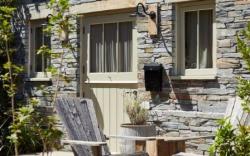 Welsh Slate walling helps new hotel win an international award
Welsh Slate walling helps new hotel win an international award
The Pig Hotel in Cornwall features rustic walling from Welsh Slate.
A £13 million conversion of a listed country house into a boutique restaurant with rooms during the Covid pandemic has been rewarded with a Top 100 hotels award, thanks in part to Welsh Slate rustic walling.
The manufacturer’s Cwt Y Bugail rustic walling features as the external masonry skin over 1,000m2 of a new luxury bedrooms extension to The Pig Hotel, formerly the Grade II listed Harlyn House, overlooking Harlyn Bay near Padstow in Cornwall.
The hotel opened in July after a three-year refurbishment project and has now won a place as “Best hotel with heart” in Tatler’s annual Travel Awards which celebrate the crème de la crème of hotels from all over the globe.
Welsh Slate’s rustic walling took multiple teams of stonemasons nine months to clad the Stonehouse - a stone courtyard building built from new but in a traditional style, with rooms whose views overlook the courtyard and the gardens.
Supplied by Cornwall-based distributor Contec SW, it was specified to match the original stone of the main 15th Century house, to provide a quality boutique to match The Pig brand image.
Contec’s managing director Rob Furse said: “We specified the Welsh Slate rustic walling for its strength and availability as the brief required traditional stone materials. We prefer to use British wherever possible and find that most of our clients do too. Intense discussions in relation to choice of colour, durability and finishes involved 100% input from this client.
“Slate’s sustainability was also a major selling point to the client who is so satisfied with it they are using it on another upcoming project.”
He added: “We regularly use the Welsh Slate rustic walling as part of our walling range, with deliveries nearly every day. It is our No 2 best-selling product for 2020. Welsh Slate has come to be an indispensable supplier to our range of natural stone products.”
John Steadman, Welsh Slate’s specification sales manager for the south west and Wales, said: “This project shows off our rustic walling extremely well. This material is becoming more frequently used in Cornwall where there is a lot of high-end building going on, in places like Rock.”
Describing The Pig Hotel at Harlyn, the seventh in the boutique chain, Tatler wrote: “The stardust that sets The Pig hotels apart is the owner Robin Hutson, whose award-winning ‘restaurants with rooms’ concept has completely changed the face of the British hotel scene.
“The Pig at Harlyn Bay exemplifies his understanding of how a good dose of tradition and history mixed with fantasy are vital in creating the dream country house hotel.”
WELSH SLATE AGGREGATE IS THE ONE FOR TENSAR
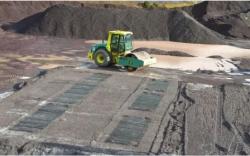 New study shows slate by-product is cheaper than other aggregates for reinforced earth structures.
New study shows slate by-product is cheaper than other aggregates for reinforced earth structures.
Slate by-product as an alternative to traditional aggregate fill in reinforced earth structures has been shown to be up to 60% more cost effective.
Those are the findings of an award-winning study supported by Welsh Slate, the UK’s leading natural slate manufacturer, and Tensar International, a world-leader in technology-driven soil reinforcement and mechanical ground stabilisation.
The year-long study was carried out by Owen Bracegirdle, a consultant engineer at independent multi-disciplinary engineering, environmental and project management consultancy Egniol Environmental, which is based near Bangor in north Wales, just a few miles from Welsh Slate’s main Penrhyn Quarry.
Owen chose the study, Utilising secondary slate waste aggregate as an alternative to common aggregate fill within reinforced earth retaining structures, as his dissertation for a BEng (Hons) in Civil Engineering. And it helped him win the CIHT* Cymru Wales region’s award for Emerging professional of the year 2018.
Tensar has already suggested slate as the aggregate fill for two major civil engineering infrastructure schemes scheduled to happen in the next couple of years.
It had already been apparent, through extensive research and input from industry professionals, that secondary slate aggregate sourced from north Wales was not being used to its full potential.
The study set out to establish if secondary slate aggregate (13mm blinding) from Welsh Slate’s main Penrhyn Quarry was acceptable for use as the aggregate fill within a Tensar reinforced soil retaining structure.
The selected secondary slate aggregate, and all its associated parameters, was compared with a commonly-used primary aggregate fill (granite/limestone) to not only establish its structural performance and feasibility but most importantly, to highlight the financial benefits of its use.
The study first researched current and relevant design textbooks, online literature and design standards, such as BS 8006, to establish the design requirements and parameters of a suitable aggregate fill within a reinforced soil structure. Observation and analysis of all relevant testing results was then carried out to numerically compare slate aggregate against granite/limestone fill.
Additional site and laboratory testing was also undertaken as part of the study to address any gaps in the data. Most importantly, through research and testing, it was found that the reinforced earth design relied upon the reduction factors applied on Tensar geogrid grades.
These reduction factors are derived from the selected fill being used. It was concluded that the reduction factors RFCH (Chemical and Environmental Reduction Factor) and RFID (Installation Damage Reduction Factor) were critical in determining the feasibility of using the selected aggregate fill.
Installation damage testing was carried out at Penrhyn Quarry to ascertain the RFID for the secondary slate aggregate. This determined the selected secondary slate aggregate provided varying design reduction and safety factors over the alternative aggregates.
These subsequent variances were inputted to two design cases. The design outputs highlighted the geogrid requirements and content for both the slate and granite/limestone design cases. The design outputs were also analysed taking aggregate costs into consideration and these highlighted that the slate aggregate not only performed successfully as a structural fill within a reinforced soil structure but also provided a commercial benefit through substantial cost savings.
In summary, the study highlighted that, in the scenario modelled, the Welsh Slate 13mm blinding provided a 61.49% cost saving over the limestone equivalent. A limestone Type 1 sub-base aggregate (a larger stone usually used for highways applications) was also considered, with the Welsh Slate secondary aggregate delivering a 21.77% saving.
Tensar product and technology manager for walls and slopes Craig Roberts said the study was something the manufacturer had wanted to do for some time, as it had conservatively used slate fill previously on private schemes but required official test results for public projects.
“We were more than happy to get involved as it served a dual purpose,” he said.
“We had always been confident that slate could be used as an alternative but now we have the proof, through testing and this should give us an advantage at tender stage. Without Owen and Welsh Slate we would have had to get the testing done another way.”
Craig added:
"That using slate could require additional stronger layers of geogrid, as the material can cause minimal additional installation damage compared to granite and limestone, which has to be accounted for within the design.
“But the additional cost of this is more than offset by the overall structure savings,”
Owen said:
“Being from the area and growing up around the slate tips it was just something I wanted to do and was really interesting to me. I’m really happy with the results from a commercial aspect and with the award from a personal one.”
Sean Edwards from the aggregates division of Welsh Slate, now part of the Breedon Group, said:
“We are always looking at ways to maximise the yield of material extracted and material recovery from historical slate waste tips and are delighted to have helped Owen not only to reach this commercial conclusion but to win an award in doing so.”

